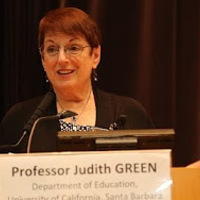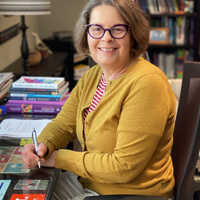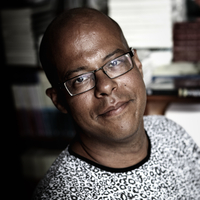
Dr Monika Krajcovicova
Dr Monika Krajcovicova is a University Lecturer and Researcher in early childhood and primary education, focusing on interculturality, educational equity, and social justice, and an Intercultural Competence Specialist. Monika's research explores early childhood, primary, and higher education, aiming to enhance educational practices, policies, and experiences for children from diverse backgrounds. She is committed to creating inclusive environments that support disadvantaged families and empower marginalized groups. Additionally, Monika enriches university students' experiences through internationalization efforts, fostering a globally aware, inclusive academic community.
Dr Monika has served on the International Editorial Board of the Social Pathology and Prevention (S.P.P.) journal and was a Management Committee Member of the Multicultural Families Organisation Inc., Gold Coast, Australia. She is a member of the Awards Alumni Network, Australia; the Teaching and Education Research Association (TERA); the Australian Association for Research in Education (AARE); and the British Educational Research Association (BERA).
Dr Krajcovicova has held various leadership roles in higher education, including Coordinator for International Relationships (2007-2010) and Vice-Dean of International Relationships (2010-2011) at the Faculty of Education, University of Presov, Slovakia. She served as Program Director (2015-2017) for the Graduate Certificate, Diploma, and Master of Early Childhood Education at Griffith University, Australia, and as Program Co-coordinator (2023) for the Bachelor of Primary Education at The University of Notre Dame Australia.
Monika has received numerous teaching commendations, including the 2023 Student Experience of Teaching Survey Commendation, the 2022 Academic Director's Commendations for Teaching and Learning at Griffith College, and Teaching Commendations in 2021 and 2018. Her awards and fellowships include the 2011 Endeavour Awards Research Fellowship at Monash University, the 2010 Erasmus Teaching Staff Mobility Programme at Queen Maud University College in Norway, the 2009 Lifelong Learning Programme at Roma Tre University in Italy, the 2008 Ruth Crawford Mitchell Scholarship at the University of Pittsburgh, US, and the 2006 National Scholarship (MINERVA) Programme at Manchester Metropolitan University, UK.
Dr Monika has served on the International Editorial Board of the Social Pathology and Prevention (S.P.P.) journal and was a Management Committee Member of the Multicultural Families Organisation Inc., Gold Coast, Australia. She is a member of the Awards Alumni Network, Australia; the Teaching and Education Research Association (TERA); the Australian Association for Research in Education (AARE); and the British Educational Research Association (BERA).
Dr Krajcovicova has held various leadership roles in higher education, including Coordinator for International Relationships (2007-2010) and Vice-Dean of International Relationships (2010-2011) at the Faculty of Education, University of Presov, Slovakia. She served as Program Director (2015-2017) for the Graduate Certificate, Diploma, and Master of Early Childhood Education at Griffith University, Australia, and as Program Co-coordinator (2023) for the Bachelor of Primary Education at The University of Notre Dame Australia.
Monika has received numerous teaching commendations, including the 2023 Student Experience of Teaching Survey Commendation, the 2022 Academic Director's Commendations for Teaching and Learning at Griffith College, and Teaching Commendations in 2021 and 2018. Her awards and fellowships include the 2011 Endeavour Awards Research Fellowship at Monash University, the 2010 Erasmus Teaching Staff Mobility Programme at Queen Maud University College in Norway, the 2009 Lifelong Learning Programme at Roma Tre University in Italy, the 2008 Ruth Crawford Mitchell Scholarship at the University of Pittsburgh, US, and the 2006 National Scholarship (MINERVA) Programme at Manchester Metropolitan University, UK.
less
Related Authors
Judith L Green
University of California, Santa Barbara
Josiah Heyman
University of Texas at El Paso (UTEP)
Nicola Jane Holt
University of the West of England
Andreas Umland
National University of "Kyiv-Mohyla Academy"
Douglas H Clements
University of Denver
Paul R Carr
Université du Québec en Outaouais
Beth Ferri
Syracuse University
Denilson Lopes
Universidade Federal do Rio de Janeiro (UFRJ)
Armando Marques-Guedes
UNL - New University of Lisbon
Martin O'Neill
University of York
InterestsView All (18)










Uploads
Books by Dr Monika Krajcovicova
Chapters by Dr Monika Krajcovicova
Articles by Dr Monika Krajcovicova
Conference Papers by Dr Monika Krajcovicova
This article describes the partial results of the long-term field research, made in terms of Dr Monika Krajcovicova's PhD dissertation within the realization of the project VEGA 1/4529/07 ”Adaptive Abilities and Competencies of the Romany Children".
This article describes the partial results of the long-term field research, made in terms of Dr Monika Krajcovicova's PhD dissertation within the realization of the project VEGA 1/4529/07 ”Adaptive Abilities and Competencies of Romany Children"."
Príspevok prezentuje rozvoj tvorivosti v súčasnej materskej škole, v kontexte rozvoja
osobnosti dieťaťa predškolského veku. Poukazuje na kompetencie tvorivého učiteľa, s využitím tvorivých hier.
their basic educational needs. Inclusive education seeks to develop the full potential of each individual and
promote social cohesion. One of the possible alternatives for successful inclusion of Romany (Gypsy) in
Slovakia and improving the quality of their school education and life seems to be finding and applying
educational approaches that take into account ethnic, cultural and social differences and gain knowledge and
competences that all Romany students will be able to apply in their community life. The presentation will
focus on current research finding of Romany (Gypsy) parent’s voices; what school means to them, what
experiences and expectations the parents have from the formal education system, what are preferred adaptive
competences of Romany children, as well as the demands and expectations of the parents regarding the
education of their children, all in the context of successful inclusion from their point of view.
One possible alternative for increasing the quality of elementary school education and the successful progress of Romas in the process of school education seems to be the search and application of educational approaches that consider ethnic, cultural and social differences between Romany children and youth. When analyzing this suggested alternative deeper, we realize that we have insufficient knowledge in the field of cultural particularities, in regards to the family environment and home education of Romany children, of the parents' attitudes and opinions concerning their children's schooling, of the adaptive competences, abilities, tasks and activities, which the Romany family requires and which the parents consider particularly important and specific for Romany children. One of the possible solutions for acquiring this knowledge was to carry out a longitudinal field survey, aimed at increasing the quality of elementary school education of Romany pupils in Slovakia.
All communities of refugee background should feel supported by the state and the majority, and have the power to strive for a better quality of life, while still being able to proudly proclaim their own culture in formal schooling. Culturally inclusive schools appreciate diversity, perceive it as a natural part of a modern society, and encourage all individuals regardless of their cultural background, race, ethnicity, religion, beliefs, gender, or language. This study is an introduction to the doctoral research and presentation of a pilot study concerning the expectations and experiences of the parents with refugee backgrounds in the context of early learning for their children in Australia. This paper looks at diversity and successful inclusion of children from families of refugee backgrounds into formal early learning systems, by creating culturally inclusive, safe and supportive learning environments.